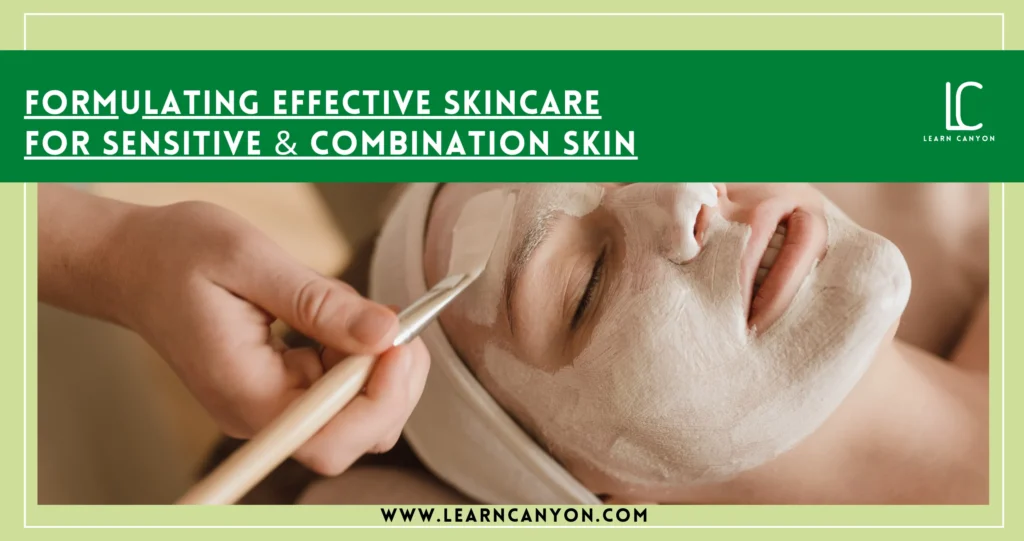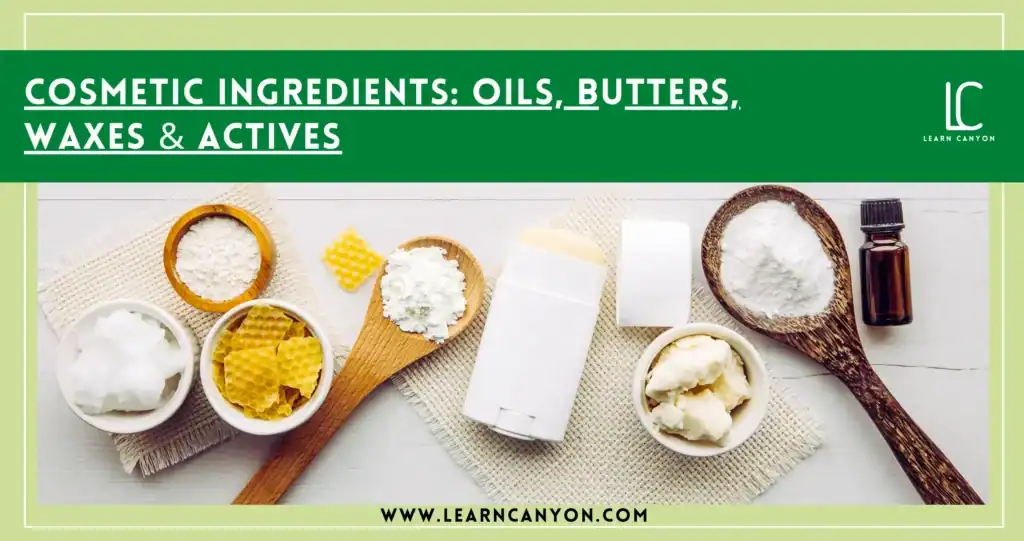In my “Tips and tricks for formulating products that work for oily & dry skin” blog, I have discussed in detail the importance of formulating products for different skin types, the most common skin types, and key considerations for formulating for oily and dry skin types.
I suggest you read the blog Tips and tricks for formulating products that work for oily and dry skin.
In today’s blog we will learn about Understanding the needs of sensitive skin and combination types of skin along with the key ingredients, different tips for formulating gentle, non-irritating products that suits sensitive and combination types.
Sensitive Skin
Understanding the needs of sensitive skin
Sensitive skin is easily irritated by products or environmental factors. Its symptoms include redness, itching, burning, and stinging. Here are some of the special requirements of sensitive skin:
Cleansed: Sensitive skin should be cleansed with gentle cleansers that are free of harsh chemicals and fragrances.
Moisturization: Sensitive skin requires regular moisturization to stay hydrated and protected. Look for fragrance-free and non-comedogenic (won’t clog pores) moisturisers.
Sun protection: Wearing sunscreen every day is important regardless of skin type, but it is especially important for people with sensitive skin. The sun can irritate the skin and exacerbate sensitivity. Look for a broad-spectrum sunscreen with an SPF of 30 or higher.
Irritants should be avoided: People with sensitive skin should avoid products and environmental factors that can irritate their skin. Certain detergents, moisturisers, sunscreens, and emulsifiers may fall into this category.
Key ingredients for formulating for sensitive skin
The key ingredients for sensitive skin formulation are those that are gentle and non-irritating. These ingredients should be free of harsh chemicals and fragrances, and they should clean, moisturise, and protect the skin without irritating.
Some of the most common ingredients used in sensitive skin formulations include:
Humectants, such as hyaluronic acid, glycerin, and propylene glycol, attract water to the skin. These ingredients can help to prevent moisture loss.
Emollients include ceramides, squalane, and shea butter. These ingredients can aid in the protection of the skin’s barrier and the reduction of irritation.
Occlusives: Occlusives, such as petrolatum, lanolin, and beeswax, form a barrier on the skin to prevent moisture loss. These ingredients can be used to protect sensitive skin formulations from environmental irritants.
Ingredients that soothe: Ingredients that soothe can help to reduce inflammation and redness in sensitive skin. Oatmeal, aloe vera, and calendula are some popular soothing ingredients.
Niacinamide (vitamin B3) is a multi-tasking ingredient that can help to strengthen the skin barrier, reduce inflammation, and improve skin texture. Because it is gentle and non-irritating, it is an excellent choice for sensitive skin.
Panthenol, also known as provitamin B5, is a soothing and moisturising ingredient that can help improve skin barrier function while also reducing redness and irritation. Because it is gentle and non-irritating, it is an excellent choice for sensitive skin.
Allantoin is a soothing and healing ingredient that can aid in the reduction of inflammation and redness. Because it is gentle and non-irritating, it is an excellent choice for sensitive skin.
When creating a formula for sensitive skin, it is critical to select ingredients that are known to be safe and effective for this skin type. It is also important to avoid using harsh or drying ingredients, such as alcohol and denatured alcohol.
Tips for formulating gentle, non-irritating products
- Choose the appropriate ingredients. It is critical to select ingredients that have been proven to be safe and effective for all skin types. Avoid using harsh, drying, or irritating ingredients like alcohol, denatured alcohol, and artificial fragrances.
- Use a mild pH range of ingredients because the skin’s natural pH is around 5.5, it is important to formulate products with a pH close to this. Products with an excessively high or low pH can irritate the skin.
- Make use of gentle preservatives. Preservatives are required to prevent bacteria growth in skin care products, but they can also be irritating. Choose gentle preservatives that work in low doses and are less likely to irritate the skin.
- Soothing ingredients: Ingredients that soothe can help to reduce inflammation and redness in sensitive skin. Sandalwood powder, aloe vera, and calendula are all popular soothing ingredients.
Combination Skin
Understanding the needs of combination skin
Combination skin is a skin type that has both oily and dry areas.
The unique needs of combination skin:
Cleaning: Combination skin requires regular cleansing to remove excess oil and dirt from the oily areas while leaving the dry areas with their natural oils. It is critical to use a gentle cleanser designed specifically for combination skin.
Exfoliation: Exfoliation can help combination skin remove dead skin cells and unclog pores in oily areas. Exfoliating too much, on the other hand, can irritate the dry areas of the skin.
Moisturising: Combination skin requires moisture in both oily and dry areas. However, it is necessary to select non-comedogenic moisturisers that will not clog pores.
Sun protection: People with combination skin should wear sunscreen every day. The sun can dry out dry areas of the skin and aggravate oiliness. It is critical to use a broad-spectrum sunscreen with an SPF of 35 or higher.
Key ingredients for formulating for combination skin
Ingredients that help to balance oil production, hydrate the skin, and prevent clogged pores are essential when formulating for combination skin.
The following are some of the most common ingredients used in combination skin formulations:
Salicylic acid and Glycolic acids are organic ingredients used to exfoliate the skin and unclog pores without any harmful effects. They are also effective at reducing redness and help to reduce the appearance of fine lines and wrinkles.
Niacinamide (vitamin B3) is a multi-tasking ingredient that can help balance oil production, reduce inflammation, and improve skin barrier function.
Hyaluronic acid is a humectant that aids in the hydration of the skin. It is non-comedogenic and lightweight, making it an excellent choice for combination skin.
Ceramides are lipids that aid in the strengthening of the skin barrier and the prevention of moisture loss. They are also useful for reducing redness.
Zinc is a mineral with antimicrobial properties. It can aid in the reduction of blemishes and the soothing of irritated skin.
Witch hazel is a natural astringent that can help tighten pores and decrease oil production.
Tea tree oil is an essential oil that has antibacterial and anti-inflammatory properties. It can be used to treat acne and soothe irritated skin.
It is also important to avoid using heavy or occlusive ingredients, as these can clog pores and exacerbate breakouts.
Tips for formulating products
- Use a mixture of humectants, emollients, and occlusives. Humectants draw water to the skin, emollients soften and smooth the skin, and occlusives prevent moisture loss. It is critical to use a balanced ratio of these three types of ingredients when creating hydration products. Too much of one ingredient can cause issues such as dryness, greasiness, or breakouts.
- Make use of a light texture. Products that are too heavy or greasy can clog the pores and cause breakouts. It is important to use a lightweight texture when creating hydrating products. This will help to ensure that the product absorbs easily and does not clog pores.
- Ceramide moisturiser is a rich, creamy moisturiser containing ceramides, which help to strengthen the skin barrier and prevent moisture loss. It hydrates without being too heavy or greasy.
- Gel moisturisers are preferred as they are lightweight and non-comedogenic, making them an excellent choice for people with oily or combination skin. They can hydrate the skin without overburdening it.
Conclusion
Combination skin has areas that are both oily and dry. When creating a formula for combination skin, it is critical to select ingredients that will aid in the balance of oil production and hydration levels. It is also critical to select non-comedogenic ingredients that will not clog pores.
Sensitive skin: Pollution and environmental factors can irritate sensitive skin. When creating products for sensitive skin, it is critical to use hypoallergenic and non-comedogenic ingredients. It is also critical to avoid the use of harsh chemicals or fragrances.
Carry out Experiments
I suggest that you try out different skincare products and tailor them as per your specific needs. There is no such thing as a one-size-fits-all formula for sensitive or combination skin types, and what works for one person may not work for another. It is critical to find products that are appropriate for your skin type and concerns.
Tips for experimenting with skincare products:
- Begin with a basic routine. Trying too many new products at once can be confusing. Begin with a simple formulation. When your formulation is perfect, you can move on to other products like a toner, serum, or exfoliator.
- When weighing, pay close attention.
- Take note of how your skin reacts to different ingredients.
- Please be patient. It takes time to create the perfect skincare formula. Don’t be disheartened if you don’t see immediate results. Finding the best products may take several weeks or even months.
- Consider your skin issues. What are your primary skin issues? Do you want to get rid of acne, fade dark spots, or prevent wrinkles?
- Select ingredients that have been specifically designed to address your issues.
- Combine items. Different skincare ingredients can be combined to create a synergistic effect that is tailored to your specific needs.
Reminder to consult with a dermatologist for specific concerns or sensitivities.
It’s worth noting that I’m a Cosmetologist with a background in Cosmetic Science and Technology. For example, I can help you in making creams, lotions, and other cosmetics.
However, I cannot provide medical advice because I am not a medical professional. I recommend seeing a dermatologist if you have any specific skin concerns or sensitivities. A dermatologist can assess your skin type and concerns and recommend the most appropriate products and treatments for you.
Here are some specific concerns or sensitivities to which you should speak with a dermatologist:
- Acne
- Eczema
- Psoriasis
- Rosacea
- Reactions to allergens
- Melanoma of the skin
- Sun exposure
- Hyperpigmentation
- Skin sensitivity
A dermatologist can also assist you in developing a skincare routine that is specific to your needs and concerns. I hope you find this information useful.











